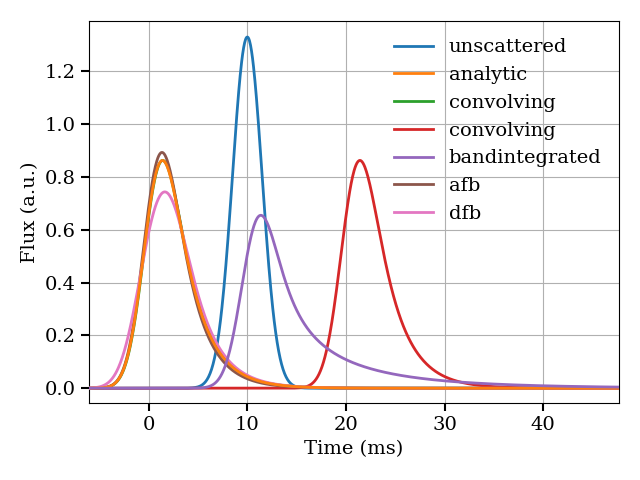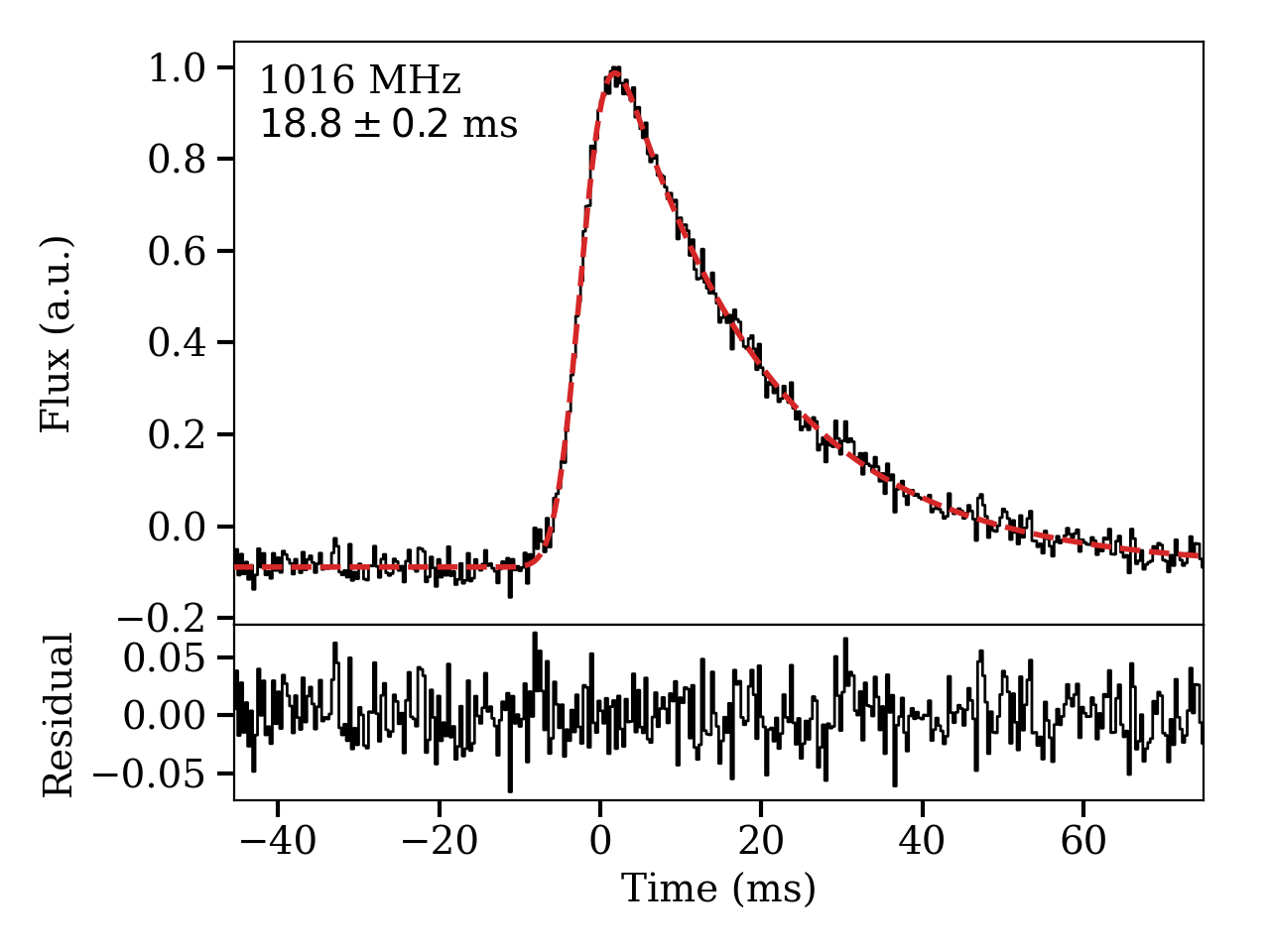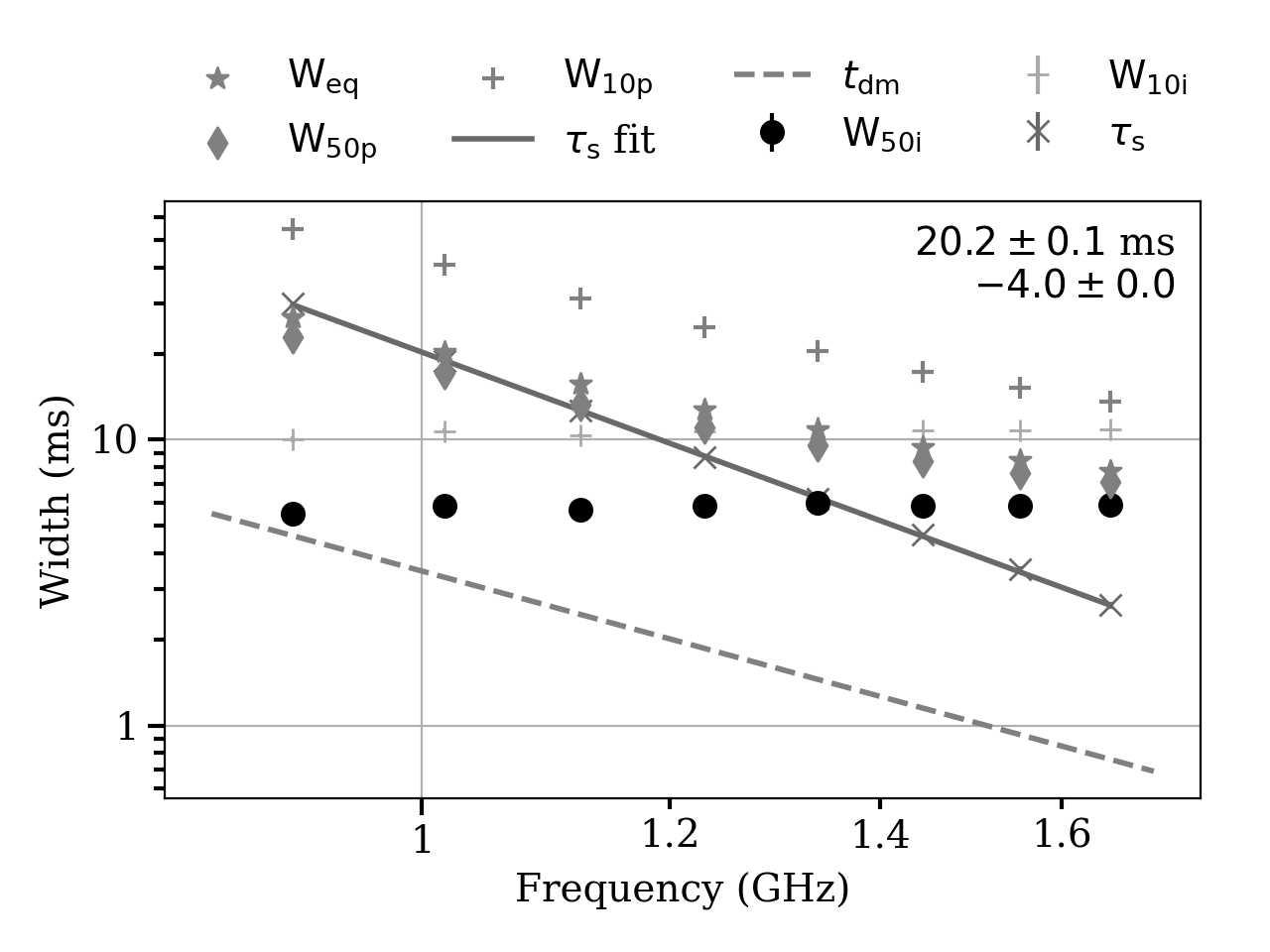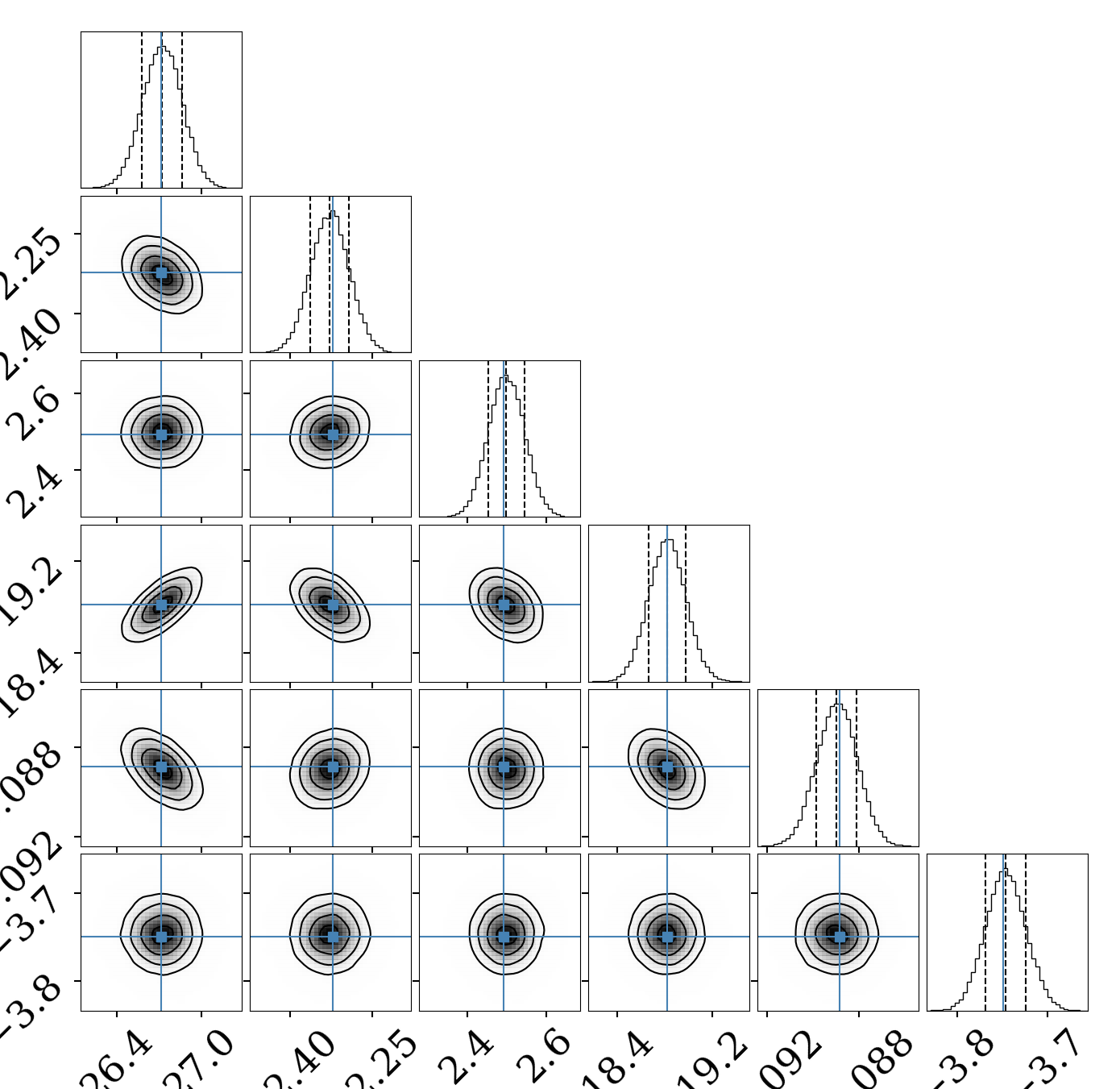Scattering fits of time domain radio signals (Fast Radio Bursts or pulsars).
Project description
Scatfit: Scattering fits of time domain radio signals (Fast Radio Bursts or pulsars)
This repository contains code to fit Fast Radio Burst or pulsar profiles to measure scattering and other parameters. The code is mainly developed for Python 3, but Python 2 from version 2.7 onwards should work fine.
Author
The software is primarily developed and maintained by Fabian Jankowski. For more information feel free to contact me via: fabian.jankowski at cnrs-orleans.fr.
Paper
The corresponding paper (Jankowski et al. 2023, MNRAS) is available via this NASA ADS link.
Citation
If you make use of the software, please add a link to this repository and cite our corresponding paper. See above and the CITATION and CITATION.bib files.
The code is also listed in the Astrophysics Source Code Library (ASCL).
Installation
The easiest and recommended way to install the software is through pip from the central PyPI index by running:
pip install scatfit
This will install the latest release and all its dependencies. If you need a more recent version of the software, install it directly from its GitHub software repository. For instance, to install the master branch of the code, use the following command:
pip install git+https://github.com/fjankowsk/scatfit.git@master
This will also automatically install all dependencies.
Please verify that your installation works as expected by downloading a pre-generated SIGPROC filterbank file with synthetic data that comes bundled with the GitHub repository:
wget https://github.com/fjankowsk/scatfit/raw/master/extra/fake_burst_500_DM.fil
Then run the main analysis on the filterbank data file like this:
scatfit-fitfrb fake_burst_500_DM.fil 500.0 --fitscatindex --fscrunch 128 --fast
You should see several diagnostic windows open. The terminal output should show an updated DM close to 500 pc cm$^{-3}$, a scattering index near -4.0, and a scattering time at 1 GHz of about 20 ms.
Documentation
Further documentation of the software is available on our dedicated Read the docs website.
Usage
$ scatfit-fitfrb -h
usage: scatfit-fitfrb [-h] [--compare] [--binburst bin] [--fscrunch factor] [--tscrunch factor] [--fast] [--fitrange start end]
[--fitscatindex]
[--smodel {unscattered,scattered_isotropic_analytic,scattered_isotropic_convolving,scattered_isotropic_bandintegrated,scattered_isotropic_afb_instrumental,scattered_isotropic_dfb_instrumental}]
[--showmodels] [--snr snr] [--publish] [-z start end]
filename dm
Fit a scattering model to FRB data.
positional arguments:
filename The name of the input filterbank file.
dm The dispersion measure of the FRB.
options:
-h, --help show this help message and exit
--compare Fit an unscattered Gaussian model for comparison. (default: False)
--binburst bin Specify the burst location bin manually. (default: None)
--fscrunch factor Integrate this many frequency channels. (default: 256)
--tscrunch factor Integrate this many time samples. (default: 1)
--fast Enable fast processing. This reduces the number of MCMC steps drastically. (default: False)
--fitrange start end Consider only this time range of data in the fit. Increase the region for wide or highly-scattered bursts.
Ensure that most of the scattering tail is included in the fit. (default: [-200.0, 200.0])
--fitscatindex Fit the scattering times and determine the scattering index. (default: False)
--smodel {unscattered,scattered_isotropic_analytic,scattered_isotropic_convolving,scattered_isotropic_bandintegrated,scattered_isotropic_afb_instrumental,scattered_isotropic_dfb_instrumental}
Use the specified scattering model. (default: scattered_isotropic_analytic)
--showmodels Show comparison plot of scattering models. (default: False)
--snr snr Only consider sub-bands above this S/N threshold. (default: 3.8)
--publish Output plots suitable for publication. (default: False)
-z start end, --zoom start end
Zoom into this time region. (default: [-50.0, 50.0])
$ scatfit-simpulse -h
usage: scatfit-simpulse [-h]
Simulate scattered pulses.
options:
-h, --help show this help message and exit
Profile scattering models
Several profile scattering models, i.e. pulse broadening functions and instrumental contributions, are implemented and others can easily be added. The image below shows a selection of them.
Example output
The images below show some example output from the program obtained when fitting simulated filterbank data.
Project details
Release history Release notifications | RSS feed
Download files
Download the file for your platform. If you're not sure which to choose, learn more about installing packages.
Source Distribution
Built Distributions
Filter files by name, interpreter, ABI, and platform.
If you're not sure about the file name format, learn more about wheel file names.
Copy a direct link to the current filters
File details
Details for the file scatfit-0.2.21.tar.gz.
File metadata
- Download URL: scatfit-0.2.21.tar.gz
- Upload date:
- Size: 24.3 kB
- Tags: Source
- Uploaded using Trusted Publishing? No
- Uploaded via: twine/4.0.2 CPython/3.10.13
File hashes
| Algorithm | Hash digest | |
|---|---|---|
| SHA256 |
eb3559be8a1ee7c765fd09f8f9bee9776b7e8fcd933b4d78c52495d3656ed3e1
|
|
| MD5 |
4c90cf166a788375b24626cb14011bdd
|
|
| BLAKE2b-256 |
0840ff59c7efe9c824e5102d6fdba15e957b695463780eba6425c1e44f2cc510
|
File details
Details for the file scatfit-0.2.21-cp311-cp311-manylinux_2_17_x86_64.manylinux2014_x86_64.whl.
File metadata
- Download URL: scatfit-0.2.21-cp311-cp311-manylinux_2_17_x86_64.manylinux2014_x86_64.whl
- Upload date:
- Size: 519.2 kB
- Tags: CPython 3.11, manylinux: glibc 2.17+ x86-64
- Uploaded using Trusted Publishing? Yes
- Uploaded via: twine/4.0.2 CPython/3.11.5
File hashes
| Algorithm | Hash digest | |
|---|---|---|
| SHA256 |
788f32f162472888d760510d631cb000ceb60da9cf23600f0436c0730bfd3196
|
|
| MD5 |
927dffed3970eac96c55fad265b4ed0d
|
|
| BLAKE2b-256 |
3d423c6e66a98ef0f220304745e77498e534f8c3e56c575cf554188244d75d72
|
File details
Details for the file scatfit-0.2.21-cp310-cp310-manylinux_2_17_x86_64.manylinux2014_x86_64.whl.
File metadata
- Download URL: scatfit-0.2.21-cp310-cp310-manylinux_2_17_x86_64.manylinux2014_x86_64.whl
- Upload date:
- Size: 481.9 kB
- Tags: CPython 3.10, manylinux: glibc 2.17+ x86-64
- Uploaded using Trusted Publishing? Yes
- Uploaded via: twine/4.0.2 CPython/3.11.5
File hashes
| Algorithm | Hash digest | |
|---|---|---|
| SHA256 |
fceadb969f01474257f5232ecde9db0285aa8f5be7da368cabc234b1c06a555c
|
|
| MD5 |
d49c5ba0a6b99bfc3f808ec3907b8a3b
|
|
| BLAKE2b-256 |
8a046f4b2c32d7af4103291a1ec6f200e938234d9cb71c5a42ea3da1ca5fbe8a
|
File details
Details for the file scatfit-0.2.21-cp310-cp310-macosx_13_0_arm64.whl.
File metadata
- Download URL: scatfit-0.2.21-cp310-cp310-macosx_13_0_arm64.whl
- Upload date:
- Size: 101.1 kB
- Tags: CPython 3.10, macOS 13.0+ ARM64
- Uploaded using Trusted Publishing? No
- Uploaded via: twine/4.0.2 CPython/3.10.13
File hashes
| Algorithm | Hash digest | |
|---|---|---|
| SHA256 |
ccad67fbdccbf46fc6e9b139e2a520bef7073ea41d2adaf8e26fd22e9ff5fcc0
|
|
| MD5 |
b07a5debe5f885d956b5dd2cabe2edf2
|
|
| BLAKE2b-256 |
d7f933c89119995f4a4effd22688a8c2f6d9596af0397120788bc5011026afe9
|
File details
Details for the file scatfit-0.2.21-cp310-cp310-macosx_12_0_x86_64.whl.
File metadata
- Download URL: scatfit-0.2.21-cp310-cp310-macosx_12_0_x86_64.whl
- Upload date:
- Size: 105.8 kB
- Tags: CPython 3.10, macOS 12.0+ x86-64
- Uploaded using Trusted Publishing? No
- Uploaded via: twine/4.0.2 CPython/3.10.13
File hashes
| Algorithm | Hash digest | |
|---|---|---|
| SHA256 |
1e00152faab2f43a58bc0ccbc26082ef03abb9cfb731cbd30f43fb269a3b666f
|
|
| MD5 |
f08750b0735bc852f4e493e15ca4c57d
|
|
| BLAKE2b-256 |
7c68cff7f0b790ffc75855503f3ad087eec623a1238d15687b8a53c58de81815
|
File details
Details for the file scatfit-0.2.21-cp39-cp39-manylinux_2_17_x86_64.manylinux2014_x86_64.whl.
File metadata
- Download URL: scatfit-0.2.21-cp39-cp39-manylinux_2_17_x86_64.manylinux2014_x86_64.whl
- Upload date:
- Size: 484.4 kB
- Tags: CPython 3.9, manylinux: glibc 2.17+ x86-64
- Uploaded using Trusted Publishing? Yes
- Uploaded via: twine/4.0.2 CPython/3.11.5
File hashes
| Algorithm | Hash digest | |
|---|---|---|
| SHA256 |
c9c9324df55d7b4489254f7e2f33ba775b355c41f1dcc5aeb89f28ea1494ed97
|
|
| MD5 |
e3da0557edd49b3ca4ab8833bcb61056
|
|
| BLAKE2b-256 |
b14d5ad7d65e4259b8576758ddfcc4d59c46ceae1d890cc9d3b135c361e31f6a
|
File details
Details for the file scatfit-0.2.21-cp38-cp38-manylinux_2_17_x86_64.manylinux2014_x86_64.whl.
File metadata
- Download URL: scatfit-0.2.21-cp38-cp38-manylinux_2_17_x86_64.manylinux2014_x86_64.whl
- Upload date:
- Size: 488.9 kB
- Tags: CPython 3.8, manylinux: glibc 2.17+ x86-64
- Uploaded using Trusted Publishing? Yes
- Uploaded via: twine/4.0.2 CPython/3.11.5
File hashes
| Algorithm | Hash digest | |
|---|---|---|
| SHA256 |
4ff6d2ead0e7379aafb47d069dfee9c884964b1feb8778cd6512d8bf6040af30
|
|
| MD5 |
6302d4c4154fe7da7746feec8b8c85b1
|
|
| BLAKE2b-256 |
d247f29c9b1e066efc75a33b9ecbbc22377219758b124403297071fae3c494a7
|
File details
Details for the file scatfit-0.2.21-cp37-cp37m-manylinux_2_17_x86_64.manylinux2014_x86_64.whl.
File metadata
- Download URL: scatfit-0.2.21-cp37-cp37m-manylinux_2_17_x86_64.manylinux2014_x86_64.whl
- Upload date:
- Size: 455.8 kB
- Tags: CPython 3.7m, manylinux: glibc 2.17+ x86-64
- Uploaded using Trusted Publishing? Yes
- Uploaded via: twine/4.0.2 CPython/3.11.5
File hashes
| Algorithm | Hash digest | |
|---|---|---|
| SHA256 |
60fcf77b4036906b719191effd8fae5a78ab5f6a07989ac0ca512f3fa56f6d6f
|
|
| MD5 |
4a61c698871a7276270c50309f219e44
|
|
| BLAKE2b-256 |
e91e6703f7639393b86376bd2bb7366be9d1984becb6d1b15cc32ac33985ae78
|





















